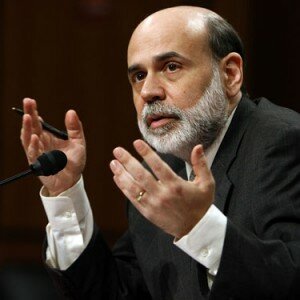
Investors Fear That More Jobs Will Mean Higher Interest Rates
July 8th, 2013In September of 2012, the Federal Reserve launched an unprecedented, ongoing, and escalated version of its quantitative easing scheme in which the bank began making monthly purchases of billions worth of toxic mortgage-backed securities, which had become fiscally poisonous during the housing crisis of 2007. Trading fake paper for worthless mortgages has the effect of stuffing the economy with excessive levels of credit, stimulating malinvestment. Until the program comes to an end, investors will have a difficult time determining which industries to invest in, as the economy’s traditional pricing mechanism has been distorted beyond recognition.
One major side effect of the Fed’s addiction to debt just emerged: The Guardian is reporting that last week’s better-than-expected jobs numbers, after first yielding a modest rise in stock prices, then caused a stock plunge as investors realized that the Fed is set to taper off of its QE stimulus program once employment figures improve. In a normal economy, investors should be excited when more Americans find new jobs. However, this is no normal economy — it’s a Frankenstein market, sewn together out-of-order and held in place by an addiction to debt.
Up Is Down And Down Is Up
Ordinarily, investors would be excited to discover that more Americans found new jobs. Such information typically means that new consumers will soon be flush with cash to make purchases, which should improve the outlook of nearly any business. However, that would only be the case in a rational economy driven by traditional economic actions such as private investment and consumer spending. The US economy is now suffocating on disproportionate amounts of Fed-issued stimulus, robbing rational decision makers of the market signals they need in order to make sound choices.
As such, we now live in an upside-down economy in which investors fear good news about employment. When the Federal Reserve begins tapering off of its quantitative easing program, the result will be higher interest rates. Inevitably, we will have the recession that was delayed by QE once the program ends, and this is what investors are fearing.
Job Gains Largely Part-Time
Another scary economic indicator appeared in June’s jobs report. The New York Times is reporting that the biggest gains were in part-time jobs, as employers are unsure how ObamaCare will affect full-time employees. On the balance, the economy lost more full-time jobs than it gained and earned back a significantly higher number of part-time jobs.
In response, the Obama administration announced a delay in the implementation of the business mandate portion of ObamaCare from 2014 to 2015. However, the individual mandate portion of the bill will still go into effect in 2014. This leaves many working families in a dicey situation as the individual mandate approaches.
Ultimately, fear and uncertainty dominate the market as investors remain paralyzed, waiting to gain an understanding as to when the economic stimulus will end and as to how much ObamaCare will cost businesses.
Silver Circle is showing now on Video on Demand platforms! Check it out on our watch online page and find out about local theater showings of the film and other special events on our -->event page -->.


